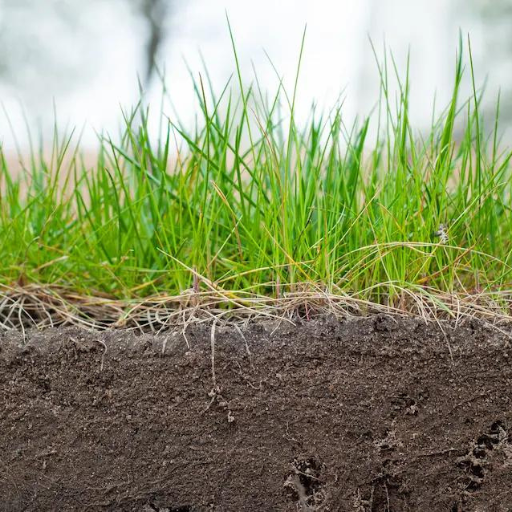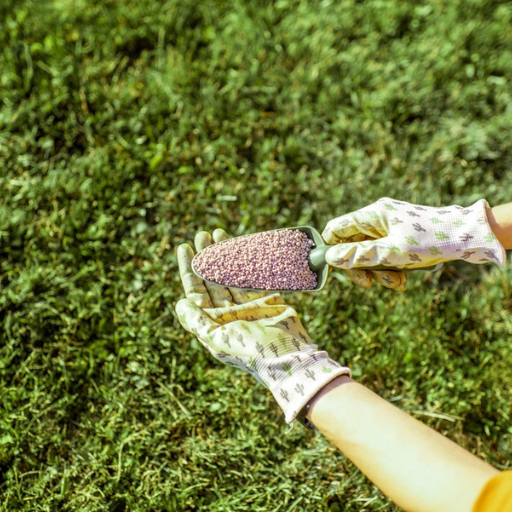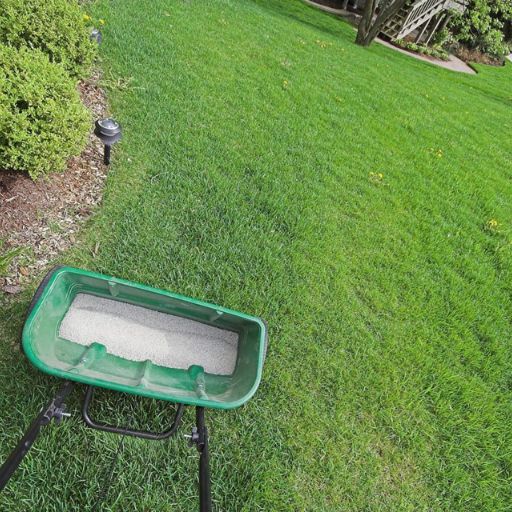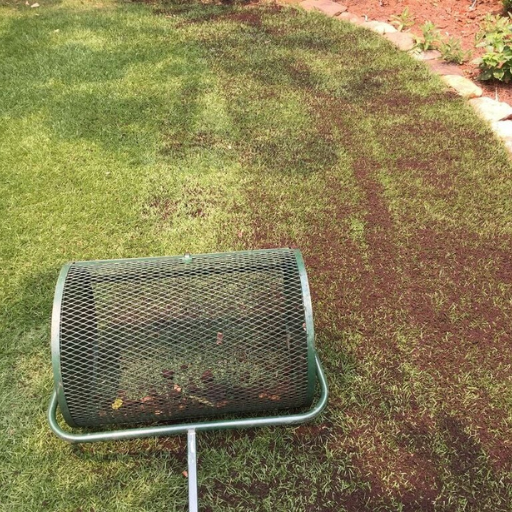Welcome to our comprehensive guide on using organic fertilizer for Bermuda grass! Whether you’re a seasoned gardener or just starting to take an interest in lawn care, you’re about to discover the numerous benefits of choosing organic solutions for your lawn. In this blog, we’ll explore the unique needs of Bermuda grass, delve into the advantages of using organic fertilizers over synthetic ones, and offer practical tips on how to maintain a lush and healthy lawn throughout the year. By the end of this article, you’ll have a clear understanding of how organic fertilizers can contribute to a thriving, environmentally-friendly lawn care regimen.
What is organic fertilizer and why choose it for bermudagrass?

What constitutes an “organic” fertilizer?
An organic fertilizer, unlike synthetic chemicals, is one that is made from natural sources like plant remains, animal faeces or composted materials. These fertilizers provide necessary nutrients and thus improve soil structure as well as support beneficial microorganisms. When you choose to use the organic type of fertilizers for your Bermuda grass, it indicates that you have decided to be environmentally friendly in maintaining your lawn through sustainable development of the soil and reducing environmental pollution risks.
How Organic Fertilizer Helps Bermuda Grass
There are several major benefits associated with the application of organic fertilizers on bermuda grass. First and foremost, organic fertilizers enrich the soil by increasing its content of organic matter which enhances its structure, water retention capacity and nutrient availability for plants. Consequently this strengthens root system resulting to a healthier grass. Secondly they slowly release nutrients over time such as nitrogen, phosphorus and potassium needed by Bermuda Grass to grow steadily throughout the season. This slow release mechanism helps check movement of nutrients into water systems hence minimizing pollution in environment caused by leaching too much nitrogen into our rivers as water drains our lawns after raining or watering them heavily. Finally they promote beneficial microbial activity in soils thereby increasing biodiversity while boosting pest/disease resistance. As a result, choosing between synthetic and non-synthetic options might help ensure year-round survival of Bermuda grass.
Difference between Synthetic VS Organic Fertilizers
Organic against synthetic fertilizers vary greatly according to their contents, ways how plant gets its food from soils using them as well as how they affect our living environment among many other factors. Natural decomposition processes make sure that organic fertilisers derived from things like manure composting materials slowly release their nutrients . Such long lasting supply ensures long-term growth of a robust root system promoting general healthiness within the given region covered by Bermuda Grass. Conversely chemically synthesized ones contain certain ratios of nutrients designed to be easily available to plants. Synthetic fertilizers lead to rapid growth of bermuda grass; however, they also leach nutrients, degrade soils and pollute the environment at a low level. Organic matter is not present in these commercial options, unlike synthetic ones that possess no organic matter. Therefore, going for organic fertilizers results in a well-balanced and sustainable approach to taking care of the lawn that ensures both the grass and its soil will continue to thrive as well.
How to determine the right N-P-K ratio for your bermuda grass lawn?
What is the N-P-K ratio like?
N-P-K ratio stands for Nitrogen (N), Phosphorus (P) and Potassium (K). The three elements determine the nutrient proportion in a fertilizer. They have different functions in plant life, with nitrogen encouraging leafy growth, phosphorus helping to develop roots and produce flowers, while potassium promotes healthy plants that are also stress tolerant. For your Bermuda grass yard, it is important to choose an N-P-K ratio that corresponds to the exact nutritional requirements of the turf so as to achieve optimal growth and health.
How do you interpret soil test results for bermuda grass?
Making sense of soil test data involves understanding what nutrients are present in your soil as well as its pH level so that you can devise a workable fertilization strategy. First check if your soil ranges from 5.8-7 which is ideal for Bermuda grass; amendments might be necessary where this does not fall within range. Next we find out about nitrogen (N) levels since they affect lush green leaves but unfortunately rarely exist in soil tests because they fluctuate often. Next come phosphorus (P) and potassium (K); phosphorus stimulates root development while potassium enhances general good health stage by stage in the plant’s life cycle. If there are any deficiencies or excesses of these minerals indicated by the findings of your soil test, therefore fertilize to balance them up accordingly by choosing a fertilizer with suitable N-P-K ratios on its label. Additionally weigh other nutrients like calcium magnesium and sulfur all supporting rapid growth rates among plants. Accurate interpretation will enable you plan precisely and effectively care for your Bermuda grass lawn.
Recommended N-P-K ratios for bermudagrass
Your fertilizer should have appropriate N-P-K ratios if you want a healthy Bermuda grass lawn. During active growing season, general guidelines call for NPK ratio of 3-1-2 or 4-1-2, which means there is a higher nitrogen (N) concentration for vigorous growth. Consequently, 16-4-8 or 24-6-12 would be recommended. Nitrogen is crucial for lush green foliage; phosphorus helps roots develop and potassium assists in general stress tolerance and prevention of diseases. Towards the end of fall, it is advisable to apply a fertilizer with reduced nitrogen but increased potassium levels such as that with a 1-0-1 ratio to ready the lawn for winter dormancy. You will need to tweak this plan based on soil test results and local conditions.
Which organic fertilizers are best for bermuda grass?

Bermudagrass: Best granular fertilizers
Some of the top-rated granular fertilizers for bermudagrass include three recommended options by experts and lawn care enthusiasts:
- Scotts Turf Builder Southern Lawn Food: This fertilizer is specially made for Southern lawns, making it ideal for bermudagrass. It has abundant amounts of nitrogen which provides thick and green growth that protects the grass against heat and drought.
- Milorganite 0636 Organic Nitrogen Fertilizer: Milorganite is an excellent organic choice because it is a slow-release fertilizer that supplies nutrients to plants over a long period. It has an N-P-K ratio of 4-3-0, which promotes healthy growth without burning the grass.
- LOYAL Fertilizer: This ensures uniformity in application through consistent feeding due to its balanced nutrient ratio and smaller particle size. These also include vital micronutrients required for overall health of lawns.
These are highly esteemed fertilizers known to maintain rich, green bermudagrass through various localities as well as soil types.
Liquid organic fertilizers suitable for bermuda lawns
When choosing liquid organic fertilizers for Bermuda lawns, consider the following based on expert opinions and popular reviews:
- Simple Lawn Solutions Advanced 16-4-8 Balanced NPK: This all-in-one lawn food provides a balanced mix of nutrients essential for bermudagrass health. The product supports strong growth, deep greening and enhanced soil fertility.
- LOYAL Fertilizer: This quick action formula made this brand famous in turf vigor promotion products including root development cases among others.
- GS Plant Foods Liquid Kelp Organic Seaweed Extract: This powerful natural fertilizer nourishes with seaweed extract that helps improve soils naturally. Essential trace minerals are supplied while improved root development boosts resistance to stress conditions by Bermuda Grass (Cynodon dactylon).
These liquid organic fertilizers are praised for their ability to provide immediate nutrient availability and ease of application, making them perfect for maintaining a healthy and lush bermudagrass lawn.
Factors to consider when choosing organic lawn fertilizers
There are several important considerations in selecting organic lawn fertilizers that will give you the best outcome for your Bermuda grass:
- Nutrient Content: Check the nutrients in it and ensure they are sufficient for your Bermuda. Go for products that have a combination of NPK (Nitrogen, Phosphorus, Potassium) ratio that will promote overall health of the garden.
- Soil Health: Organic fertilizers improve soil structure and microbial activity. Better soil structure and root growth can be achieved by using liquid kelp or seaweed extracts.
- Application Ease: A fertilizer with an easy application process should be picked. Liquid fertilizers also offer easier distribution as compared to granular ones.
- Environmental Impact: Environmentally friendly fertilizers should be used since they do not pollute runoff water or endanger children and pets around them.
- Product Reviews: Trusted websites often have user feedbacks concerning effectiveness or reliability on specific organic fertilizers hence reading such reviews would help much.
By focusing on these factors, you can select an organic fertilizer that supports robust growth, soil health, and environmental sustainability for your bermudagrass lawn.
How to properly apply organic fertilizer to bermuda grass?

Granular fertilizers spreaders
For granular fertilizers, the use of a spreader can ensure even distribution and efficient application into your bermudagrass lawn. Follow these steps for optimum results:
- Choose the Right Spreader: A broadcast or rotary spreader is best for large areas while a drop spreader is ideal for accurate edging along flower beds and edges.
- Calibrate Your Spreader: Look at the fertilizer bag to know specific settings. To avoid harming your lawn and environment from over-application, adjust the spreader opening to the recommended setting.
- Apply in Dry Conditions: Fertilizer should be applied to dry grass to prevent clumping and uneven distribution. Avoid fertilizing before a rainstorm so that there is less runoff danger.
- Spread Evenly: Walk at a consistent pace, slightly overlapping each pass so that every part of the lawn will receive enough fertilizer. For uniform coverage, consider applying it in a crisscross pattern.
- Water the Lawn: Watering the lawn lightly after application helps in soil penetration of fertilizer down to grassroots but avoiding runoff by not over-watering.
By doing this, you will have grown healthy Bermuda grass with granular fertilizer uniformly applied throughout its whole area enhancing its growth vigor.
The even application of liquid fertilizers
To apply liquid fertilizers evenly follow these guidelines:
- Choose the Right Equipment: Use an end-hose sprayer or backpack sprayer as they allow you to apply evenly across your yard. Ensure that your sprayer is clean and working well.
- Mix According to Instructions: Dilute as directed on the bottle to avoid burning your grass.
- Apply in Optimal Conditions : Apply when it is dry just like with granular types; don’t do if windy because it leads to drift reduction.
- Consistent Application: Maintain an even pace and spray a continuous pattern. Overlap each pass slightly to ensure uniform coverage.
- Water Lightly After Application: Post application, lightly water the lawn in order for the fertilizer to sink into the ground but not too much water that would cause runoff.
By adhering to these recommendations, one can achieve an evenly fertilized bermudagrass lawn that promotes healthy growth and has a plush appearance.
Timing and frequency of fertilizing bermuda grass
It is essential to fertilize Bermuda grass at the right time and with the recommended frequency in order to optimize its health and development. As suggested by leading experts;
- Early Spring – Late Summer: Begin fertilizing early in spring as soon as grass starts greening up around March or April. Keep on fertilizing every 6-8 weeks until late summer, generally August or September.
- Nitrogen Application: During each fertilizer application apply 1-1.5 pounds of nitrogen at 1000 sq.ft. This will help maintain dense, vigorous turfgrass.
- Avoid Late Fall: Avoid applying fertilizer on Bermuda grass during late fall this will lead to disease and reduced cold tolerance of your bermuda grass. Let it go dormant naturally.
- Soil Testing : Take soil tests every other year to determine specific nutrient needs and adjust your fertilizer according to ensure balanced soil healthiness.
This fertilization program ensures that necessary nutrients are available for your bermudagrass at optimal times throughout the growing season resulting in a healthy, lush lawn all through summer.
How can you enhance bermuda grass growth with organic lawn care tips?

The importance of mowing practice
Proper mowing practices play a significant role in maintaining healthy bermudagrass growth. First and foremost, it’s crucial to have the right height when you cut your grass. Bermudagrass thrives when the lawn is mowed between 1 and 1.5 inches high. Regularly cutting at this height encourages dense growth and prevents weeds from getting a foothold. Furthermore, make sure that the edges of your mower blades are sharp for neat cuts and reduce stress on the grass.
Another important practice is the one third rule which states that never remove more than one-third of the grass blade length in a single mow. Mowing off too much all at once can weaken the plant, leaving it susceptible to disease or drought stress. Finally, leave clippings on the ground because they will provide additional nutrients to boost its growth and development after mowing. By following these guidelines for cutting, bermudagrass health conditions can be substantially developed.
Watering your Bermuda Grass
In my experience and research, watering bermudagrass correctly is crucial for its health and growth.I usually water my lawn deeply but less frequently aiming for about 1-1 ½ inches of water per week including rainfall that comes over.This allows deep root penetration hence good drought tolerance.I prefer early morning watering so as to reduce rate of evaporation and allow grass blades to dry before night thus minimizing chances of fungal diseases.In addition,I keep observing signs such as blueish tinted lawn or footprints remaining visible on it indicating that my lawn may be drying out.By following these guidelines in watering I ensure that my bermudagrass stays green all year round.
Dealing with common pests and diseases in Bermudagrass
According to what I have experienced plus consistent studies made by researchers, I have learned that controlling pests,diseases are very important task in having a good bermudagrass lawn. Such insects as armyworms, sod webworms and white grubs may be a source of significant harm if they are not controlled in time.Firstly,I check my lawn frequently to notice if there is any pest activity like munched leaves or brown spots on the grass.If I find that there is an infestation, I choose the right insecticides and use them as directed.
Moreover, Bermuda grass has some diseases for instance Dollar Spot,Brown Patch,and Spring Dead Spot.To avoid these problems ,it is necessary to maintain a healthy lawn through proper methods of cutting watering and fertilization.For example,I always ensure that my turf is not overwatered and nitrogen content is sufficient because stressed out grasses are more susceptible to disease.Once it starts showing up on blades which are laid horizontally,the only option left for me is spraying fungicides made specifically for such diseases.By keeping watch over the yard and responding promptly when challenges strike ,I am able to control pests and diseases hence making my bermudagrass lawn durable and colorful.
Frequently Asked Questions (FAQs)

Q: Is a slow-release fertilizer beneficial for bermuda grass?
A: There are several benefits of using a slow release fertilizer on bermuda grass, as it gives constant supply of nutrients over time. This type of fertilizer is useful in maintaining an even growth and beautiful green turf.
Q: Which organic fertilizer is recommended for a new lawn of bermuda grass?
A: For a new lawn of bermuda grass, I would recommend a well balanced 16-4-8 ratio type. Be sure to go for an organic option that provides the necessary nutrients without damaging the young plants.
Q: Can sandy soil be used with organic fertilizers?
A: Yes, sandy soil can use organic fertilizers. They will also enable water to be retained more effectively while enhancing your Bermuda Grass with essential minerals.
Q: Can children and pets safely play on organic fertilizers?
A: Organic fertilizers are generally safe for kids and animals if used according to instructions. Unlike synthetic fertilizers that contain dangerous chemicals they do not pose any risks when it comes to handling them by pets and children thus making them ideal for landscaping purposes.
Q: Do you need specific irrigation practices when applying organic fertilizer with bermuda grass?
A: Definitely, right watering is necessary. The best way to water Bermuda grass is infrequently but deeply so as to encourage it grow deep roots. After applying manure or compost tea ensure your ground has neither too much nor too little moisture content especially following local rain waters.
Q: How can I make my bermuda grass lawn look better by using organic fertilizer?
A: You should follow regular feeding schedule using organic fertilizers, properly mow and water your lawn as well as control weeds through an appropriate herbicide that could be applied along with the above mentioned type of manure safely meant for such uses.






